Updated | Gripping the drug-filled syringe, David Kwiatkowski furtively glanced around to confirm that none of his co-workers could see him. Then Kwiatkowski, a radiology technician at Arizona Heart Hospital, darted into an employee locker room, found an empty bathroom stall and locked himself inside. Sweat dripped from his face, and his stomach churned; he desperately needed a fix. Minutes earlier, he had snagged one of the syringes nurses preloaded with drugs before leaving them unattended in the operating room. It was labeled "fentanyl," an opiate many times more potent than heroin and Kwiatkowski's latest narcotic of choice.
It was about 3 o'clock in the afternoon on April 1, 2010, when Kwiatkowski screwed a hypodermic onto the syringe, placed the needle almost flat against his right arm and slid it into a vein. Slowly, he pushed the plunger, eagerly anticipating relief as the 50 micrograms of fentanyl bathed his brain.
Suddenly, he knew something had gone wrong. With only half the dose injected, Kwiatkowski felt a tingle in his feet, then in his hands. This wasn't fentanyl. The nurses had placed the wrong sticker on the syringe. As his muscles drooped, Kwiatkowski realized he had just injected succinylcholine, a powerful paralytic. That kind of labeling error could have killed a patient. Now, Kwiatkowski knew, he was the one who might die.
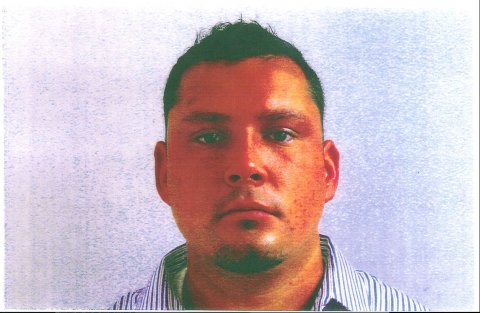
He pulled the syringe out of his arm and dropped it in the toilet before falling face first into the stall's metal door. He hit the ground, and his head flopped out from under the partition. As the drug paralyzed more muscles, Kwiatkowski could no longer breathe, though he was fully conscious. Thirty seconds passed. A medical technician entered the room, saw Kwiatkowski and screamed for help. Just as the technician was preparing to perform CPR, the paralysis eased up. By stopping the injection halfway, Kwiatkowski had taken only a small dose. He took a breath. "Shit," he said. "Shit, I'm going to jail."
A few minutes later, Kwiatkowski sat up and flushed the toilet in hopes no one would find the syringe and suspect he had been using drugs. Junkie logic.
Then there was a blur of activity. A stretcher. The emergency room. The medical technician saw the syringe in the toilet with the fentanyl label still attached. A representative showed up from Springboard, the Phoenix agency that had placed Kwiatkowski at the hospital. Under questioning, Kwiatkowski spun a ridiculous story filled with lies. Someone called the police, but the hospital refused to cooperate—a good business decision, since an audit two months earlier revealed that a nurse there had been stealing narcotics, and Arizona Heart obviously had not yet fixed the problem. Kwiatkowski left with the Springboard representative, and they drove to a nearby bar.
Downing multiple glasses of Crown Royal whiskey, Kwiatkowski knew his time in Phoenix was over. Drugs and booze had cost him another job, but no matter; that's why he was "a traveler," a technician who agencies place on short-term contracts at hospitals around the country. He knew that, probably out of liability concerns, Arizona Heart would never file an official report that might cost him his radiology tech license; none of the hospitals ever did.
Kwiatkowski returned to his hotel, booted up his laptop and did a quick Internet search. A staffing agency had a listing for a job in Philadelphia. He filled out the online application and went to bed.
The next morning, the telephone rang in Kwiatkowski's hotel room. On the line was a representative from Advantage RN, who said, "Can you start Monday?"
Addicts in Lab Coats
And so it continued, month after month, year after year, as Kwiatkowski crisscrossed the United States, landing temporary jobs at hospitals that soon discovered his drug addictions, then quietly sent him on his way. But what makes this more than just another tale of medical irresponsibility and cover-ups is an alarming fact: Kwiatkowski was one of the 1.5 million intravenous drug users carrying the hepatitis C virus. So in his travels from state to state, he infected scores of people with this potentially fatal disease as syringes he borrowed for his narcotics injections were subsequently used on patients. This set off a national health crisis, with the Centers for Disease Control and Prevention (CDC) recommending that some 12,000 patients be tested because of their contact with Kwiatkowski's blood; in one of the biggest hepatitis outbreaks in decades, at least 45 people contracted the disease, including one who died.
Still, despite the enormous impact of his cross-country infection spree, Kwiatkowski is no anomaly. According to a recent study by the CDC, nearly 30,000 people may have been exposed to hepatitis C over the past decade by infected hospital employees using narcotics intended for patients. The disease is easy to transmit in a medical setting: Once a drop of blood carrying the hepatitis virus touches something, like a needle or plastic tubing, the organism is difficult to kill. So when an infected health worker steals opiates from patients—usually replacing the clear liquid drugs with saline—the pathogen can settle on any piece of the syringe or even in the liquid injected into the patient. And hepatitis is not the only danger. Last year, an outbreak of a serious bacterial infection that killed one patient at the University of Wisconsin Hospital and Clinics was traced to a nurse who stole opiates from syringes.
But infectious exposures are only part of the threat patients face from addicts in lab coats and nursing uniforms. Not all drug diverters—as they are known—carry hepatitis or other diseases. Federal researchers estimate that 100,000 health care workers in the United States are addicts, and their theft of narcotics from patients is believed to be widespread. That fear was reinforced when the University of Tennessee Medical Center cracked down with a tough program to detect drug diverters; in its early days, the effort caught three or four employees stealing narcotics each month. In December 2013, at the University of Michigan Health System, where Kwiatkowski had worked years earlier, a nurse and a doctor overdosed on the same day using pilfered injectable drugs. And for every health care worker replacing opiates with water or sucking fentanyl out of attachable patches, there are many patients suffering from pain they don't know is untreated.
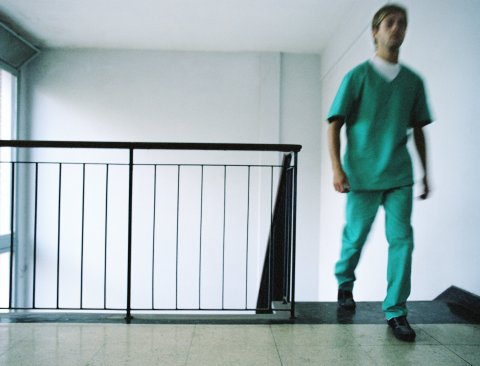
Yet no one has been able to provide a wide-scale inside look at this dirty secret within America's hospitals, primarily since no major drug diverter has ever granted a public interview. That is, until now. In a six-hour, face-to-face discussion and other lengthy communications with Newsweek, David Kwiatkowski laid out the scope of narcotics thefts and cover-ups he witnessed during his nine years working at 19 hospitals in eight states. Thousands of pages of documents—including internal hospital records, correspondence and personnel files; notes of interviews by the FBI; state investigative reports; court filings; and an array of other evidence never before publicly disclosed—back up his account. Kwiatkowski—now serving a 39-year sentence at a maximum-security federal prison for his role in the hepatitis outbreak—told a horror story of addicted health workers wandering hospital wards while stealing drugs, a tale that perhaps only he has enough detailed personal knowledge to divulge.
Kwiatkowski has nothing to gain from his disclosures; the federal system has no parole. Indeed, both Kwiatkowski and prison officials fear this article might anger other inmates and place him in danger. But Kwiatkowski, who says he is sober for the first time in decades, is haunted by the knowledge that he hurt so many people and believes he needs to make amends by revealing the scope and methods of this medical crime that endangers an unknowing public.
"Somebody has to tell how it's done, how easy it is and how the structure of the hospitals isn't any good to stop it," he says of drug diversion. "And I guess the only guy who can really do that is me."
A Shot in the Butt
Early on, all Kwiatkowski wanted to do was play baseball. Born and raised in Michigan, he seemed a typical clean-cut boy attending public school. He avoided cigarettes and alcohol; baseball was too important to risk getting thrown off the team. That changed at the end of his junior year of high school. His friends started heading into the woods on weekends, building bonfires and staying out all night drinking. Despite knowing his family's history of alcoholism, Kwiatkowski joined in. His first drink was from a bottle of Southern Comfort 100 Proof, and he loved it. By senior year, Kwiatkowski was sneaking whiskey every chance he got.
In 1998, his first year at Madonna University, he was getting tanked at least four days a week and discovered he was a mean drunk who got into fights. Then, at sophomore-year party, he met a man 10 years his senior. Through this wealthy new friend, Kwiatkowski joined a circle of boozers and druggies who frequented strip clubs and partied all night. His buddies paid for everything and let him share their never-ending supply of cocaine. Soon he was a full-blown coke addict who spent his nights prowling techno clubs in downtown Detroit.
He was also getting loaded off opiates prescribed by his doctor. Kwiatkowski suffered from Crohn's disease, a disorder in which the body's immune system attacks the gastrointestinal tract, often causing serious pain. The alcohol and cocaine provided temporary relief, although it ultimately worsened the severe aches and cramps by inflaming the digestive tract. But Kwiatkowski didn't stop getting high and drunk, and instead he persuaded his unsuspecting doctor to write him prescriptions for Vicodin, a narcotic pain reliever.
Despite all the late nights, booze and drugs, Kwiatkowski kept up with his schoolwork. He grew interested in health care and joined a two-year radiology program through the William Beaumont Hospital School of Radiologic Technology while still attending classes at Madonna. In 2003, he graduated from Beaumont, passed his certification test and registered with the American Registry of Radiologic Technologists. Now he could work at any hospital in the country.
He took a full-time job as a radiology technician at St. Joseph Mercy Hospital in Ann Arbor. That's where his crimes started; he says he learned how to commit drug diversions from a popular nurse there.
At first, Kwiatkowski kept his addictions under control, but the alcohol crept back in. He and two hospital friends started a tradition: After every shift, they would go to a nearby Holiday Inn for beer and eggs. Soon they added whiskey shots to the mix. The three men would stay at the hotel bar for six hours, downing booze as they played Golden Tee Golf, a video arcade game.
As usual, the heavy drinking worsened the pain from Kwiatkowski's Crohn's disease. He started popping Vicodin like candy, but that just made his prescriptions run out faster. Finally, Kwiatkowski told an emergency room nurse about his troubles and asked if he had pills to share. No, the nurse said, but he had a better idea.
"He gave me a shot in the butt," of a strong narcotic called Dilaudid, Kwiatkowski says. "That's when it started with the opiates, because it was so readily available."
Knowing nothing about Kwiatkowski's drinking or Dilaudid use, his doctor prescribed Percocet, another painkiller, to treat the abdominal discomfort. Kwiatkowski was boozing all morning, grabbing a few hours of sleep, popping a Percocet as he headed to work and then getting a shot of Dilaudid from the ER nurse.
One morning after their shift, that nurse drove Kwiatkowski to Detroit so they could gamble. After pulling into the casino parking lot, the nurse took out a rubber tourniquet, a syringe and a bottle of narcotics stolen from the hospital. The nurse injected the drug into his own arm and closed his eyes for a moment as it started to take effect. Then he turned to Kwiatkowski. "Want some?"
Kwiatkowski said yes, but he didn't know how to inject himself, so the nurse did it for him. Then they headed into the casino, where they drank and gambled.

The next day, the ER nurse took Kwiatkowski aside. "Hey, I'm going to leave out a vial in the trauma room after we leave. Grab it." When no one was around, Kwiatkowski snatched the small bottle of what turned out to be morphine.
"That was when I started stealing," he says. It became a routine, with the two men pilfering at least one vial of morphine a day. The nurse had full access to narcotics, but he would be a primary suspect if anyone noticed drugs were missing. Kwiatkowski wasn't cleared to handle opiates, so he wouldn't draw suspicion.
After the first couple of months, the quantity of morphine the men stole skyrocketed. For Kwiatkowski, it became as easy as ordering pizza—before work, he would call the nurse and let him know what narcotic he wanted. The nurse set the vials aside, ready for pickup, even before Kwiatkowski arrived at the hospital. By that point, Kwiatkowski was using lots of Dilaudid, taking as much as 30 times the recommended dosage for critically ill patients.
Everything seemed fine, until one morning a hospital security officer stopped Kwiatkowski. "Grab your bag," he said. "You're going to human resources."
At first, Kwiatkowski thought nothing of it. About two weeks earlier, he had totaled his car and missed work. He figured the HR folks wanted to know about that. But as soon as Kwiatkowski walked in the door, a woman said they wanted him to take a drug test. He assumed he had no choice—if he refused, they would fire him. Besides, he hadn't used any narcotics for a day, so maybe nothing would show up.
They ran the test, then told him to go home and wait for a phone call. Instead, Kwiatkowski drove to the home of his nurse friend, who panicked. "You didn't tell?" he asked. Kwiatkowski assured him he had said nothing, and the two men sat down and started shooting up Dilaudid.
Soon after Kwiatkowski got home, the hospital called. His test showed high levels of opiates. Strangely, no one told him he was fired, but Kwiatkowski figured he had lost his job. He called his father, sobbing as he asked if he could move back with his parents for a while.
Then, an idea. He telephoned the HR department at Beaumont Hospital, where he had received his training. He told them he was just finishing up his studies at Madonna University and didn't have a job. Was Beaumont hiring? They seemed delighted—yes, they had job openings; come fill out the paperwork. Relieved to have found work so quickly, Kwiatkowski typed up a résumé, taking care to leave out St. Joe's.
Two weeks passed. Just before he was scheduled to start at Beaumont, St. Joe's HR department called him in. An HR official and a drug therapist interrogated him, telling him they had heard he was stealing drugs and that he had been seen going in and out of the trauma room. And what was his relationship with the ER nurse? Just friends, Kwiatkowski said, and all the other information they had heard was wrong, he assured them.
Well, they said, he didn't have to lose his job. The hospital had a program offering addiction therapy for a year, but he would be required to take drug tests the entire time. If he finished the program, the drug issues would be wiped off his record.
"I don't need it; there's nothing wrong with me," he said. "I quit." What did he care? He already had another job. His drug thefts weren't reported to law enforcement, the federal government or Michigan's Department of Licensing and Regulatory Affairs.
Kwiatkowski looks back at St. Joe's as the tragic missed opportunity. Had he accepted therapy, the horrific events that followed might never have happened. "They should have called the police," he says. "They should have put a flag on me."
In a statement, St. Joe's says, "We take reporting seriously and comply with all requirements." Moreover, the hospital confirms that it strives "to work with any employee to receive the treatment they may require, as part of our mission to be a compassionate, healing organization."
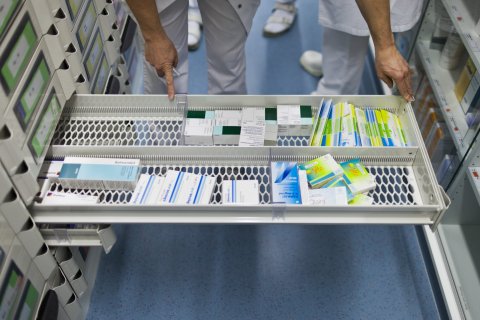
Kwiatkowski lasted at Beaumont only a few weeks. While no one found out about his drug pilfering, the hospital discovered he had lied about his work history. He turned in his badge and drove home at about 9 o'clock in the morning. Immediately, he got on the Internet, found a position open at Detroit Medical Center and applied—this time including St. Joe's on his résumé.
Fairly soon, he heard back. He got the job.
Free Narcotics
His new hospital assigned him the late shift, ending about 2 a.m., which Kwiatkowski thought was great, since it gave him time to party at the Elysium Lounge, a downtown nightclub. For a couple of hours each night, he downed shots of whiskey at Elysium, then headed home for another eight or nine hours of drinking and cocaine. But he always stopped by 1 o'clock in the afternoon. After all, he needed time to sober up for work.
He started hitting on some of the pretty nurses, and soon he had a girlfriend. When they were off-duty, she would join him in drinking and smoking marijuana.
Then the cycle started again. The drinking brought back the pain from his Crohn's, but Kwiatkowski didn't consider stopping his massive daily doses of Crown Royal. Not when he knew there was another treatment available—and a nurse who could get it for him. "Hey, you know, I don't want to go to the hospital, but I've been having these pains," he told his girlfriend. "Is there any way you could hook me up with some morphine or Dilaudid?"
The nurse didn't hesitate. "Sure," she said. "No problem."
His girlfriend brought him plenty of narcotics stolen from the hospital, although they made sure never to make the handoff at work—too dangerous. He started shooting up every day. Soon, though, he found he needed more to get high, but he was embarrassed to ask his girlfriend for it. After all, he didn't want her to find out he was a druggie, a thought he now recognizes makes no sense. Instead, he hit up a different friend, who sold him OxyContin, a narcotic in pill form.

When he was loaded on drugs, he felt good—worked out at the gym, went out to restaurants, did his job. When the narcotics weren't around, he went into withdrawal and couldn't function. So he would start downing fifths of whiskey, worsening the Crohn's and feeding his craving for more drugs.
Then everything changed. His girlfriend left him, and he received a promotion to the cardiac catheter lab. Kwiatkowski was thrilled. He was now participating in lifesaving procedures and carrying a pager for emergency heart attacks. He decided he wasn't going to blow this opportunity. He quit the narcotics and cut back on the drinking. He found a new girlfriend in the nursing staff of the same department, one who didn't use drugs.
But he started going out to the clubs by himself so he could drink without her seeing him. She complained about his frequent absences, and he worried that all the clubbing might cost him this woman he really liked. Since he couldn't handle all the alcohol, he turned to the first option that came to mind. He started stealing drugs from the hospital.
It was so easy, he could scarcely believe it. The procedures in his unit often required morphine and other narcotics for patients in pain. Nurses would lay out the bottles of opiates on a counter before catheterization began. Full vials were rarely used; usually, a few milligrams remained inside the bottles once the patients were gone. Afterward, nurses logged how much of the narcotics had been used and how much remained in each bottle. Then, with a witness standing by to make sure the drugs were disposed of, the nurses tossed the bottles into the garbage.
Kwiatkowski would fish the vials out of the trash, pocket them, take them home after work and shoot up in the bathroom so his girlfriend wouldn't see. He had found a source of free narcotics, easy and risk-free. For Kwiatkowski, the whole process was a rush: the stealing, the sneaking around, the surreptitious injections.
But it was then that he had the accident that changed his life. He and a colleague were lifting a patient from a stretcher to a bed in the intensive care unit. Neither noticed that a used needle was under the bed sheet. As they settled the patient, the needle poked Kwiatkowski. He never shared needles with other addicts and always made sure to use new ones on himself. Kwiatkowski believes he contracted hepatitis from that needle-prick in 2006.
Unaware of any new health problems, he and his girlfriend got engaged, and for the first time, Kwiatkowski found a hospital policy he couldn't circumvent: Spouses and fiancées weren't allowed to work in the same department. So he applied in June 2006 for a position at the University of Michigan Health System in Ann Arbor.
Before bringing him on, the university ran a background check and discovered a problem on his official record, one that worried HR. On August 11, Kathleen McCollum, the hospital's employment office manager, sent an email to Donna Eder, director of human resources in radiology.
A background check found something troubling about Kwiatkowski, McCollum wrote; a misdemeanor traffic violation had resulted in a warrant being issued, probably because the fine hadn't been paid. "This may be something that is resolved but still showing up on his record," she wrote. "But it is probably worth asking him about, so there aren't any surprises down the road."
No Polygraph
The traffic violation problem was easily cleared up, leaving Kwiatkowski set to start his new job on August 21, 2006. Quickly, he discovered that procedures for disposing of drugs were different at this hospital, so his garbage technique wouldn't work. Kwiatkowski was a little nervous about stealing full bottles, so he returned to his old supplier of OxyContin and decided to lay off the injectable narcotics.
Still, what he saw at this new hospital amazed him. Extra medications were checked out from the pharmacy for procedures—far more than could possibly be needed. He saw colleagues pocket bottles, but he had no idea how the missing narcotics weren't showing up in the hospital records. One day, a bottle of fentanyl went, which set off gossip among the staff but not much more. Speaking to a colleague about what he considered to be the hospital's sloppy controls of narcotics, Kwiatkowski said, "This place doesn't even do drug tests."
Then, after just a month on the job, two partially filled vials—one with a narcotic called Versed, the other with fentanyl—disappeared from the procedure room, apparently when the medical staff left the room to get a patient. Linda Campbell, a nurse in radiology, told her boss, and they searched for the missing vials. When they didn't turn up, Campbell called security. The first real drug theft investigation involving Kwiatkowski was about to begin. Security conducted interviews for weeks; while several employees said they could not vouch for Kwiatkowski, investigators found no evidence he had stolen anything.
A few weeks later, more drugs disappeared. A nurse named Wendy Baker signed out three vials of fentanyl and three vials of Versed; two were used on a patient. Baker hid the remaining four vials in a Kleenex box in the patient's room. When Baker returned from lunch, she discovered the vials were gone.
A nursing manager in the radiology department called security and said she suspected Kwiatkowski. Not only was he new, but she had learned of some problems in his past. She gave no further details.
The next day, two security officers interviewed Kwiatkowski. They told him he didn't have to answer questions and was allowed to leave at any time. "Oh, that's fine," he told them. "I want to help you guys out."
One officer asked if he had taken the vials. Kwiatkowski half smiled and said, "No. No, I didn't do it." Then he chuckled.
Under further questioning, Kwiatkowski said he had no idea who had stolen the drugs, but he had some suspicions. He also said he knew everyone thought he was the thief because he was the new guy. People didn't like him, he said, because he had a lot more training and experience than the rest of the staff. "I feel like somebody's setting me up because they think I'm a big know-it-all."
Kwiatkowski told investigators he had worked at Beaumont and Detroit Medical; he didn't mention St. Joe's. When the officer called HR at Beaumont, he was transferred to a recording saying the hospital did not provide previous employment verification. The person who answered the phone at Detroit Medical also told the investigator the hospital would not give out information regarding a previous employee's resignation or whether the hospital would rehire Kwiatkowski.
Then, on December 7, it happened again. A nurse named Staci Royer obtained a vial of fentanyl, placed it on a desk, then left to get a drink of water. When she returned, the bottle was gone. The staff launched a search; four hours later, the fentanyl was discovered under a towel beneath a cart. Once again, Kwiatkowski was the chief suspect, and he was suspended, pending an investigation. Although Kwiatkowski had earlier offered to take a polygraph, he backed out when a date for a test was set, saying that a lawyer had advised him not to do it.
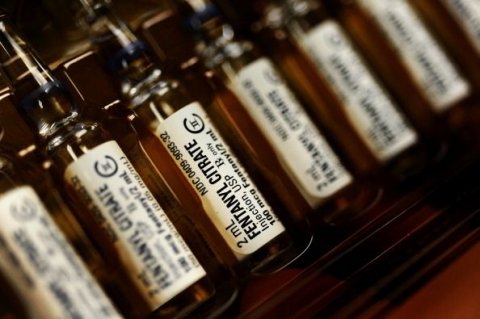
The security officers pressed him, but Kwiatkowski stayed adamant. Well then, one of the officers said, he must be the one who was stealing the drugs. Then and there, Kwiatkowski decided to quit. The investigation was closed, but since no conclusions had been reached, no formal report about Kwiatkowski was filed with any agency.
There was one other problem, Kwiatkowski says: The hospital never caught the real thief. He hadn't yet grown comfortable with stealing vials from anywhere but the garbage, which meant a drug addict or dealer was still on staff at the radiology department.
"I want to make an emphasis of this," Kwiatkowski says. "I did not take anything from the University of Michigan. I've admitted to everything, but I won't admit to that. That was not me."
'I Can Get It'
In two weeks, Kwiatkowski landed a job on the midnight shift in the radiology department at Oakwood Annapolis Hospital in Wayne. He started partying again, and his life became a blur of drinking, cocaine, sleep and work. But that didn't last. A few months after Kwiatkowski started at Oakwood, a manager told him they were sending him to an offsite facility for a drug test. Kwiatkowski refused. Another job gone. And again, no report filed, since no test was run.
That day, when he drove home, he arrived to an empty house. His fiancée had packed up and left. She didn't want to marry an alcoholic addict. Now, as far as Kwiatkowski was concerned, there was no reason to hold back. He started using more cocaine, drank bourbon by the gallon and hooked up with his old OxyContin connection. Desperately needing money, Kwiatkowski took a job as a day laborer and used the cash for drugs and alcohol.
One afternoon in fall 2007, while downing cheap whiskey, Kwiatkowski saw a website for Advance Med, a staffing company that offered temporary contract jobs with hospitals. He filled out the online form and then took a nap to sleep off the booze. His ringing cellphone woke him up—it was the staffing agency. They asked for more information, then told him there was a job available at St. Francis Hospital in Poughkeepsie, New York, if he could start in a week.
Kwiatkowski agreed. He packed his Pontiac Torrent SUV and drove to Poughkeepsie. He stayed for the length of his short-term contract and then headed back to Michigan. An uneventful trip, but one that placed him on the radar of staffing agencies around the country that were always on the lookout for medical travelers. The first to call was a company called Maxim Staffing Solutions. The University of Pittsburgh Medical Center Presbyterian needed a quick placement. Would Kwiatkowski be willing to go to Pittsburgh?
He drove to Pittsburgh, set up residence in a place arranged by Maxim and started work on March 17, 2008. The first couple of weeks were uneventful; Kwiatkowski was trying, again, to stop the booze and drugs. He befriended a neighbor, a former Marine who also worked at the hospital. One day, the two men were playing on an Xbox when the neighbor asked if Kwiatkowski wanted to do some cocaine. Kwiatkowski asked him if he could also obtain some oxycodone pills. No problem, the guy said. With that, the boozing and drinking began again. He would go to work high, something he had tried to avoid in the past, but now he didn't care anymore.
Then the neighbor came by with a question. Could Kwiatkowski obtain some liquid fentanyl? Kwiatkowski had never used fentanyl, but he had been at this hospital long enough to know how easy it would be to steal the drug. "I can get it," he said.
The hospital kept preloaded fentanyl syringes in the operating room in what was known as a sterile drawer. The syringes were each labeled with a blue sticker to make sure the staff knew they contained that drug. The stickers, though, were available to everyone; Kwiatkowski gathered some and then went to the supply cabinet for an unused syringe—everyone had access to those too. Then he grabbed a bottle of saline, snuck off, loaded the syringe with the harmless water and affixed a blue sticker. He carried that syringe in his pocket until no one was near the sterile drawer. Quickly, he made his move, opening the drawer, dropping in the saline-filled syringe, then snatching one filled with fentanyl that he would later trade with his neighbor for OxyContin.
A couple of weeks passed, and Kwiatkowski got curious. He liked OxyContin, but why was fentanyl such a popular drug among addicts? So he shot up with a dose. He didn't think it was that great; still, it took the edge off of his drug cravings, so he kept on using.
In May 2008, Kwiatkowski took a fentanyl syringe from the sterile drawer, but he immediately felt worried. He thought someone had seen him do it, so he went to the locker room, squirted the fentanyl into the toilet and tossed the syringe into what is known as the "sharps box" that contained hundreds of used needles.
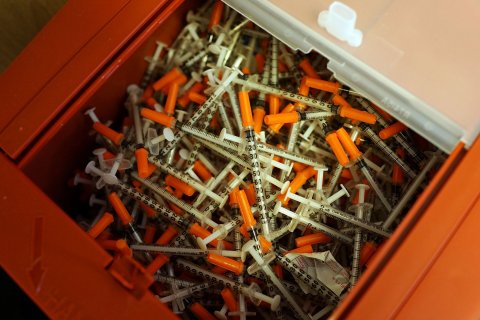
Kwiatkowski was right. Someone had noticed him entering the operating room, lift his shirt and put a syringe in his pants. Thirty minutes later, his manager instructed him to go the head nurse's office. There, several people were waiting, including a hospital security officer. Someone had seen him steal fentanyl, one official said. Kwiatkowski denied it. The security officer patted him down, found nothing, then he escorted Kwiatkowski to his locker—or at least to the one he was using that day. None of the lockers were assigned, and they couldn't be locked.
Kwiatkowski felt cocky as the officer searched the locker; he knew there was nothing to find. That is, until the officer pulled a glass bottle of morphine off the top shelf. Someone had stolen it and stashed it there.
"What's this?" the officer said.
"I don't know," Kwiatkowski replied. "You said I was taking fentanyl. Nobody said I took morphine."
Damn it. There was another drug thief in the OR who, like Kwiatkowski, apparently preferred morphine. While Kwiatkowski knew he was a criminal, he hadn't committed this crime. He was on the hook once again for someone else's theft.
Kwiatkowski was escorted down to the emergency room, where medical staff took blood and urine for a drug test. He decided not to refuse; maybe, he figured, they would come back like St. Joe's with an offer of a year of a drug therapy. The director of interventional radiology arrived and said, "What's going on, Dave?" Kwiatkowski burst into tears. "I've got a drug problem," he said, explaining that he had become addicted to Vicodin prescribed for his Crohn's disease—oh, and he smoked marijuana. Kwiatkowski had confessed to using a drug he didn't smoke and left out most of the narcotics he was taking.
The next morning, he telephoned a representative from Maxim to tell the staffing agency he had lost his job. They suspected him of stealing drugs and using them, Kwiatkowski said, but it was all bogus. Well, the representative said, Kwiatkowski needed to come down to the Pittsburgh office and take a drug test. Fine, Kwiatkowski said. Kwiatkowski drove to the office and gave a urine specimen. He was sure he would pass the drug test. Apparently, Maxim wasn't aware that it needed a blood test too. After all, as Kwiatkowski knew, fentanyl—the drug in his system—didn't turn up in urine.
The University of Pittsburgh officially reported to Maxim that Kwiatkowski had been terminated for issues related to narcotics. But Maxim declared him drug-free (incorrectly), did not report he had been fired by the university to any official agency, and put him back on its list of radiology technicians available for hospitals. It never asked officials at the hospital at the University of Pittsburgh what their drug test showed. Kwiatkowski had failed that one; his blood was full of fentanyl.
Ready to Infect
Every chance to stop Kwiatkowski had slipped away. Reports weren't filed, hospitals refused to disclose his drug problems to employers, no one pressed criminal charges, and the wrong drug tests were administered. He had also been moving from hospital to hospital unknowingly carrying the hepatitis C virus, but because of how he had obtained the drugs, he had probably never infected anyone. Had Maxim run a blood test in May 2008—rather than just checking his urine—no one might ever have been infected. But that last chance was lost as Kwiatkowski started using a new technique that left a trail of hepatitis victims.
Fourteen days after his termination from the University of Pittsburgh, Advance Med—another staffing agency—placed him at the Veteran's Administration Hospital in Baltimore. He thought the measures there to stop narcotics thefts seemed almost designed to help addicts on staff get their fix. Kwiatkowski had been hired to work in the interventional radiology lab, and whenever a case was scheduled, nurses would prepare the fentanyl syringes hours in advance. If a patient was to be seen at noon, the drugs might be laid out as early as 9 a.m. and left in the procedure room with no one else there.
Kwiatkowski did nothing for a few weeks, but the setup proved too tempting. Day after day, he would walk into the procedure room, pick up a syringe filled with fentanyl and take it into the bathroom. There, he would screw on a needle, inject himself, take the dirty needle off and put it in his pocket for later disposal. He cleaned the syringe, pulling the plunger back and forth to wash it out, then filled it with saline. Afterward, he returned to the procedure room and placed the water-loaded syringe alongside the narcotics. The cleaning attempts, though, were pointless. Even though he removed the needle, even though he washed the syringe, the hepatitis virus could remain attached to the tubing, still alive and ready to infect.
On September 8, 2008, Linwood Nelson, a Vietnam vet, came to the Baltimore VA Medical Center for a thoracic CT scan and received an injection from one of the syringes Kwiatkowski had used that day for his fentanyl fix. As the nurse unknowingly injected water into Nelson's bloodstream, a microscopic hepatitis virus inside the syringe was pumped into his body. The infection can be devastating. It can cause the liver to fail or grow cancer; it is the most common reason for liver transplants in the United States, according to the CDC. Approximately 15,000 people die every year from liver disease related to hepatitis C. Even if the liver doesn't fail completely, the deterioration of its functioning can lead to feelings of overwhelming exhaustion, nausea and serious health problems. Unfortunately, many people with the disease, like Kwiatkowski, feel few if any symptoms until the liver damage has already occurred. Indeed, four years passed before Nelson learned he had been infected.
In a statement, the Baltimore V.A. said that in the years since Kwiatkowski worked there it has adopted a series of automated drug inventory management and software systems designed to prevent drug diversions.
Immediately after Kwiatkowski's contract ended at the VA, Maxim—the staffing agency that knew he had been fired from the University of Pittsburgh hospital—placed him at Southern Maryland Hospital in Clinton. While he was there, Kwiatkowski stole no drugs and spread no hepatitis. The reason? Southern Maryland employed the simplest and most logical control over its injectable narcotics: Once drugs were out from under lock and key, the nurse kept the syringes or vials in her pocket until it was time to use them. Kwiatkowski says that unless the nurse assigned to carry the drugs stole them, no one on staff could get their hands on narcotics. The pocket system, Kwiatkowski says, was the only safety precaution that ever stopped him.
To keep himself stocked with narcotics, he now needed more money so that, like most addicts, he could buy them outside the hospital. Plus, his drinking was at a peak, which cost a lot too. So Kwiatkowski started falsifying his time sheets. The fourth time, the hospital caught it and fired him. Advance Med, one of the staffing agencies, learned he had been terminated and notified Kwiatkowski that it would not place him anymore.
No matter. Kwiatkowski contacted another agency, Springboard. He faked his credentials—eliminating terminations, resignations, drug tests and all the other problems—and in no time was placed at Maryvale Hospital in Phoenix. Obtaining drugs at Maryvale was simple; three staffers—a patient care provider, an administrator and a security guard—were dealers. From them, Kwiatkowski was able to obtain cocaine, OxyContin and Soma, an addictive oral muscle relaxant that can cause euphoria.

By summer 2009, a job opening came up at Johns Hopkins Hospital in Baltimore. But Kwiatkowski had allowed his Maryland radiology license to expire; he reapplied, lying once again about suspensions and terminations—including the one from a Maryland hospital just a few months earlier. Maryland reissued his license 22 days after he applied.
On July 9, he started at Johns Hopkins—a hospital, he says, that is a drug addict's dream. "Johns Hopkins is one of the easiest," he says. "They let the drugs just hang out. You could have had a housekeeper just walk in and get some." It was little surprise, Kwiatkowski says, that he soon crossed paths with another drug diverter. The two stole narcotics almost every shift they worked, injecting the drugs, changing the needle, replacing the painkillers with saline, then placing the used syringe back with the others ready for use. Kwiatkowski infected at least four patients at Johns Hopkins with hepatitis.
In a statement, Johns Hopkins notes that these events occurred six years ago and says it has continuously updated its procedures ever since. "Patient safety continues to be our top priority," the statement says. "We regularly re-evaluate, seek and implement new ways to improve our processes."
After a quick stop at Maryland General, Kwiatkowski was placed at Arizona Heart Hospital by Springboard. It was there that he accidentally injected himself in the bathroom with a paralytic drug, succinylcholine. After a Springboard representative and the police came, Kwiatkowski told a story about finding a fentanyl syringe in a radiology apron and using it on himself—somehow, he thought they'd be less likely to investigate this story. He was right: Arizona Heart not only declined to press charges but also refused to answer any questions from law enforcement.
For the first time, though, a staffing agency took decisive and responsible action. Springboard told Kwiatkowski it would never work with him again, then asked Arizona Heart for any report signed by Kwiatkowski regarding the incident, the names of employee witnesses and blood tests results. Arizona Heart refused to cooperate but said it had reported the event to the state Pharmacy Board—a bizarre move, since that agency regulates pharmacists and their facilities, not other hospital staff.
The stiff-arming from Arizona Heart left Springboard with little to go on. Still, Melissa Arthur, a manager with the staffing agency, wrote a complaint that included a description of what had happened and instructed her staff to send the document to the American Registry of Radiologic Technologists (ARRT), the licensing board that could pull Kwiatkowski's license and make sure he never worked again. Springboard faxed the complaint to the ARRT five business days after Kwiatkowski was discovered on the bathroom floor. The notification arrived just in time. That day, Kwiatkowski started at Temple University Hospital in Philadelphia, having been placed there by Advantage RN.
Complaint in hand, the ARRT jumped into action and did…nothing. On April 23, 2010—15 days after receiving the complaint—the ARRT Ethics Committee finally sent Kwiatkowski a letter asking for an explanation. He received it in May, while still at Temple. At the time, Kwiatkowski was going cold turkey because Temple kept tight controls on narcotics and he didn't know anyone in Philadelphia who could hook him up.
The letter terrified him. "I could have lost my license right then and there," he says. "So I did a little back research. I tried to find out what [Arizona Heart] reported. [The] hospital never reported it. It was an outside source." That, Kwiatkowski decided, meant Arizona Heart was covering everything up, which told him that whoever had complained wouldn't know the whole story. So, he figured, he could try replying to the licensing board with bald-faced lies and see what happened.
His response to the ARRT arrived on July 2, long after the 30-day deadline had passed, and it was complete fiction. He wasn't feeling well on the day he was found on the bathroom floor, he wrote, and had passed out. He awoke on a stretcher, and people were telling him they found drugs on him—but that wasn't true. He had demanded that the hospital conduct a drug test immediately (while he didn't know what that test showed, he assumed Arizona Heart would refuse to release it). Kwiatkowski also pointed out that Springboard had conducted a urine test, which he passed—not a surprise, since, just like fentanyl, succinylcholine doesn't show up in those.
"I never had any issues before, nor do I want any," he wrote. "Whatever I need to do to continue my love for my job, I will."
The lies were bad enough, but more important was a lethal piece of information he left out of his reply. Two months earlier, despite being notified by Springboard that Kwiatkowski was not rehirable, another medical staffing agency, Medical Solutions, placed him in a radiology job at Hays Medical Center in Hays, Kansas. While he was there, Kwiatkowski was feeling ill and saw a doctor, who checked his blood. And for the first time, Kwiatkowski learned he was infected with hepatitis C. But that didn't stop him from using syringes loaded with fentanyl; before he left Hays, Kwiatkowski infected at least three patients there.
The ARRT continued its investigation, although using that word to describe what the organization did is more than charitable. It searched for whether Kwiatkowski had a criminal record and found nothing; it checked if he was licensed. On July 16, 2006—98 days after Kwiatkowski had collapsed at Arizona Heart—a paralegal at ARRT requested a copy of the police report. On September 27, the police replied, saying no report existed because Arizona Heart had refused to press charges. Although Springboard provided the name and badge number of the officer who had spoken to Kwiatkowski, no one from the ARRT called him. On January 26, 2011—almost 10 months after Kwiatkowski was discovered on the bathroom floor at Arizona Heart—the ARRT Ethics Committee recommended no action be taken against him.
And throughout that inquiry into the episode at Arizona Heart, officials from staffing agencies and hospitals called the ARRT whenever they considered hiring Kwiatkowski, just to make sure there was nothing bad on his record. Each time, the ARRT gave Kwiatkowski the all-clear, allowing him to move on to the next hospital where he could steal drugs and infect patients.
"We would not have indicated to an outside third party that there's an ongoing investigation," Barbara Kummer, ethics investigation coordinator at the ARRT, later testified in a deposition.
He Waited to Die
On July 13, 2012, Kwiatkowski sat down on the bed in a dingy hotel room in Marlborough, Massachusetts. That day, he had gotten a haircut, gone to a tanning salon and sent flowers to both his girlfriend and his mother. He wanted to look good and have things in order after his suicide. He popped open three bottles of pills, including anti-psychotics and blood pressure medications, and downed hundreds of them while swigging from a bottle of vodka. Then he lay down and waited to die.
He knew his years of secrets were about to be exposed. For more than a year, he had worked at Exeter Hospital in Exeter, New Hampshire, using his favorite technique for stealing drugs: injecting himself with preloaded syringes, washing them out, filling them with saline and putting them back. Just like at almost every other hospital where he had worked, he knew other staff members were stealing narcotics too, so he didn't think what he was doing was so terrible. But in May 2012, a patient there was diagnosed with hepatitis. Then a second. And a third. And the hospital also discovered Kwiatkowski was infected with the virus.
On May 15, Exeter reported the outbreak to the state Division of Public Health Services, which in turn called in the CDC. Then the FBI joined in. CDC investigators said they were certain the multiple infections had been caused by a hospital worker's drug diversions. Kwiatkowski denied he had been stealing drugs, denied that he had hurt anyone, but during an interview with law enforcement on July 2, he said he had "lied to a lot of people" and "fabricated my life." He admitted to deceiving colleagues and friends about his fiancée, saying she had died in a car crash, and falsely claiming he had played baseball with the University of Michigan. But in the same interview, he lied about his narcotics use. He also falsely stated he had only discovered he was infected in May, when the Exeter outbreak began. An agent asked Kwiatkowski how he thought patients had contracted the disease.
"You know, I'm more concerned about myself, my own well-being," he replied. "That's all I'm really concerned about, and I've learned here to just worry about myself, and that's all I really care about now."
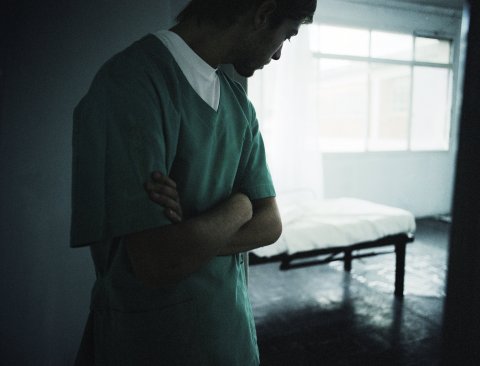
But playing the victim didn't work, and with the numbers of the infected growing, Kwiatkowski knew he would probably go to prison. He decided death was a better choice. After taking the pills, he started sobbing, and a short time later, a housekeeper walked in. Paramedics were called, and they took him to nearby Marlborough Hospital. Once he was well enough, he telephoned his parents from his hospital bed. They promised they would come see him as fast as they could.
On July 19, he heard from his parents. They had just landed at the airport and would be at the hospital in 30 minutes. "OK," Kwiatkowski said. "I can't wait to see you."
He hung up the phone, and the door to his hospital room flew open. Federal agents with guns drawn swarmed in—from the FBI, the Drug Enforcement Administration and the Marshals Service. The room filled up with law enforcement, while the patient in the next bed watched in wonder. Someone handcuffed Kwiatkowski to his hospital bed and read him his Miranda rights. He confessed to everything. He acknowledged swapping out syringes in the manner that put people at risk of contracting his virus at least 100 times.
Almost immediately after the news of Kwiatkowski's arrest went public, the director of clinical services with Maxim—the staffing agency that had placed Kwiatkowski at several hospitals—dummied up a bogus email that, if true, would prove the company had reported Kwiatkowski on March 9, 2009. (Almost four years later, the fake email was produced in response to a subpoena issued by Maryland investigators; Maxim acknowledged three months afterward that the purported email was a fake.)
As health officials discovered dozens more people infected with the same hepatitis virus carried by Kwiatkowski, he pled guilty to 14 federal charges filed against him in New Hampshire and another two in Kansas. He faced a maximum of 40 years in prison.
By the day of Kwiatkowski's sentencing, December 2, 2013, 45 of his victims had been found, including one who had died after being infected at Hays in Kansas. As Judge Joseph Laplante of the Federal District Court in Concorde listened to the prosecutors and defense lay out Kwiatkowski's crimes, he grew perplexed. Why didn't the hospitals and staffing agencies that figured out what was going on treat it like a criminal issue rather than a personnel problem? No one could provide an answer.
After that, one at a time, Kwiatkowski's victims stepped forward to describe what he had done to them and their loved ones. They told of lives destroyed, how they all knew they faced a death sentence as their livers grew increasingly impaired. Some said they were hospitalized all the time because of damage from the infections; one said he felt so sick and fatigued all the time that he wanted to die.
"The hatred for you, Mr. Kwiatkowski, from our family alone is immeasurable," said Kathleen Murray, a daughter of Lucy Starry, who had been infected at Johns Hopkins and was too sick to travel to the sentencing. 'You may only be facing drug charges, but make no mistake, you are a serial killer. Someone has already died. Many more will."
Donald Page, who had contracted the virus at Exeter, offered no comments to the court. Instead, he simply stared at Kwiatkowski and spoke three sentences. "I just want to look at the man that killed me," he said. "You killed me. Do you have anything to say to me?"
"I'm sorry," Kwiatkowski said. "I'm terribly sorry."
After more than an hour of wrenching comments from Kwiatkowski's victims, Judge Laplante passed down a sentence of 39 years, one less than the maximum. He said he had left off that single year so it would be a constant reminder to Kwiatkowski that human beings could show compassion, something he had failed to do. And with that, Kwiatkowski said goodbye to his parents and was taken away by the federal marshals.
In late 2014, I was in the large visitor area at Hazelton maximum-security prison in West Virginia. I was the first person to come see Kwiatkowski during his incarceration; his family and friends have all cut him off. I had been exchanging emails and letters with Kwiatkowski for months, and he had finally agreed to speak with me face-to-face. Prison officials objected, saying they feared other inmates would harm Kwiatkowski if this article ran because of the number of innocent people hurt by his crimes, but after more months of negotiations, agreed to allow a meeting.
After about 20 minutes, a guard unlocked a metal gate and escorted Kwiatkowski into the room. I was shocked by his appearance. At the time of his sentencing, he looked fat and sickly. In just two years, he had lost 70 pounds and the sallow skin tone, and he appeared quite healthy.
We spoke for six hours, and at the end of our time together I mentioned that he seemed well. "Since I've been locked up, I haven't thought about drugs or alcohol. This place saved my life," he said. "I'm back to the person, right now, that I was before I started drinking in high school."
Once we finished, the guards reappeared. "You make sure you tell them how sorry I am," he said to me as he was escorted away. "I'm trying to make up for what I did. I'm so sorry."
And with that, Kwiatkowski was led away, back to one of the prison cells where he will likely remain for the rest of his life.
Correction: An photo caption in an earlier version of this story incorrectly stated that David Kwiatkowski is 33 years old and a medical technician who worked in six states. He is 35 and was a radiology technologist who worked in seven states.
Update: This article was updated to include a response by the Baltimore V.A.











